
Shah of Shahs
By Ryszard Kapuscinski
Stephen Gaghan, who wrote the screenplay for Traffic, asked me to read this history of the Iranian Revolution of 1979 before we started filming Syriana, which he directed. It's a completely gripping book. Kapuscinski describes Mohammad Mossadegh, who was briefly premier of Iran in the 1950s, as someone who told the truth too early. He writes that the truth needs time to mature, because otherwise it's seen as heresy.
There's also a beautiful passage about how the shah didn't understand that destroying a man like Mossadegh wouldn't make him cease to exist: "On the contrary…he begins to exist all the more. … The scythe swings, and at once the grass starts to grow back. Cut again and the grass grows faster than ever."
By Ryszard Kapuscinski
Stephen Gaghan, who wrote the screenplay for Traffic, asked me to read this history of the Iranian Revolution of 1979 before we started filming Syriana, which he directed. It's a completely gripping book. Kapuscinski describes Mohammad Mossadegh, who was briefly premier of Iran in the 1950s, as someone who told the truth too early. He writes that the truth needs time to mature, because otherwise it's seen as heresy.
There's also a beautiful passage about how the shah didn't understand that destroying a man like Mossadegh wouldn't make him cease to exist: "On the contrary…he begins to exist all the more. … The scythe swings, and at once the grass starts to grow back. Cut again and the grass grows faster than ever."
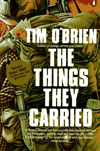
The Things They Carried
By Tim O'Brien
I resisted reading this incredibly evocative novel because I was afraid it was some male, gruff kind of story in which soldiers in Vietnam describe the kinds of weaponry they use, like lists of different types of grenades. But my oldest friend babbled about it constantly, so I dug in. In one of the more wrenching scenes, Tim, the narrator, befriends the ghost of a little girl. He asks her what it's like to be dead, and she says it's like being a book on a shelf that no one wants to read. It's a terrifying thought—being forgotten—and O'Brien encapsulates it so brilliantly.
By Tim O'Brien
I resisted reading this incredibly evocative novel because I was afraid it was some male, gruff kind of story in which soldiers in Vietnam describe the kinds of weaponry they use, like lists of different types of grenades. But my oldest friend babbled about it constantly, so I dug in. In one of the more wrenching scenes, Tim, the narrator, befriends the ghost of a little girl. He asks her what it's like to be dead, and she says it's like being a book on a shelf that no one wants to read. It's a terrifying thought—being forgotten—and O'Brien encapsulates it so brilliantly.
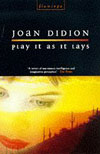
Play It As It Lays
By Joan Didion
I think this novel about a Los Angeles actress, Maria, having a meltdown in the 1960s is one of the more accessible things Joan Didion has ever written. I always think of Didion and Maria when I am in Los Angeles: the strip malls and the curly expressway on-and-off ramps, the oil rigs that look like dinosaurs and the Taco Bells. She evokes that strange alienation and sad glamour you feel coming in from the airport or driving along the city's freeways.
By Joan Didion
I think this novel about a Los Angeles actress, Maria, having a meltdown in the 1960s is one of the more accessible things Joan Didion has ever written. I always think of Didion and Maria when I am in Los Angeles: the strip malls and the curly expressway on-and-off ramps, the oil rigs that look like dinosaurs and the Taco Bells. She evokes that strange alienation and sad glamour you feel coming in from the airport or driving along the city's freeways.
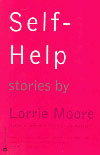
Self-Help
By Lorrie Moore
I've gone back to one of the stories in this collection, "How," several times. It describes the conflict between being comfortable in a relationship and knowing deep down that this person is not your match. At times I've read the story and thought, That's how I feel. And it's helped me to see that I, too, am in denial about wanting to leave someone. What's so interesting is that the man in the story isn't vilified. He's described as having many beautiful parts, which is true about a lot of the people we love but aren't meant to be with.
By Lorrie Moore
I've gone back to one of the stories in this collection, "How," several times. It describes the conflict between being comfortable in a relationship and knowing deep down that this person is not your match. At times I've read the story and thought, That's how I feel. And it's helped me to see that I, too, am in denial about wanting to leave someone. What's so interesting is that the man in the story isn't vilified. He's described as having many beautiful parts, which is true about a lot of the people we love but aren't meant to be with.
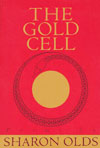
The Gold Cell
By Sharon Olds
A tutor gave me this book of narrative poems when I was in seventh grade. Even though I was young, I related to the author so much. Some lines are so moving that I think of them when I'm acting and need to convey something sad or difficult in a scene. In "Cambridge Elegy," the narrator talks about her boyfriend, Averell, who died in a car crash:
"Ave, I went ahead and had the children,
the life of ease and faithfulness…
…every millimeter of delight in the body,
I took the road we stood on at the start together, I
took it all without you as if
in taking it after all I could most
honor you."
It's sad and hopeful at the same time—the idea that she feels having a happy life is the best way to remember her lover.
By Sharon Olds
A tutor gave me this book of narrative poems when I was in seventh grade. Even though I was young, I related to the author so much. Some lines are so moving that I think of them when I'm acting and need to convey something sad or difficult in a scene. In "Cambridge Elegy," the narrator talks about her boyfriend, Averell, who died in a car crash:
"Ave, I went ahead and had the children,
the life of ease and faithfulness…
…every millimeter of delight in the body,
I took the road we stood on at the start together, I
took it all without you as if
in taking it after all I could most
honor you."
It's sad and hopeful at the same time—the idea that she feels having a happy life is the best way to remember her lover.
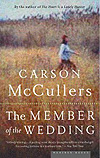
The Member of the Wedding
By Carson McCullers
Frankie, the main character in this gem of a novel, is envious because her older brother is getting married. I was about 13 or 14 when I first read it and hugely jealous of my older sister, who's now a doctor. She had this ease that I didn't have. She was the smart one, a great athlete, and popular. She would go play baseball, and eight guys would follow her. I just loved Frankie, because she was as eaten up with envy as I was.
By Carson McCullers
Frankie, the main character in this gem of a novel, is envious because her older brother is getting married. I was about 13 or 14 when I first read it and hugely jealous of my older sister, who's now a doctor. She had this ease that I didn't have. She was the smart one, a great athlete, and popular. She would go play baseball, and eight guys would follow her. I just loved Frankie, because she was as eaten up with envy as I was.




